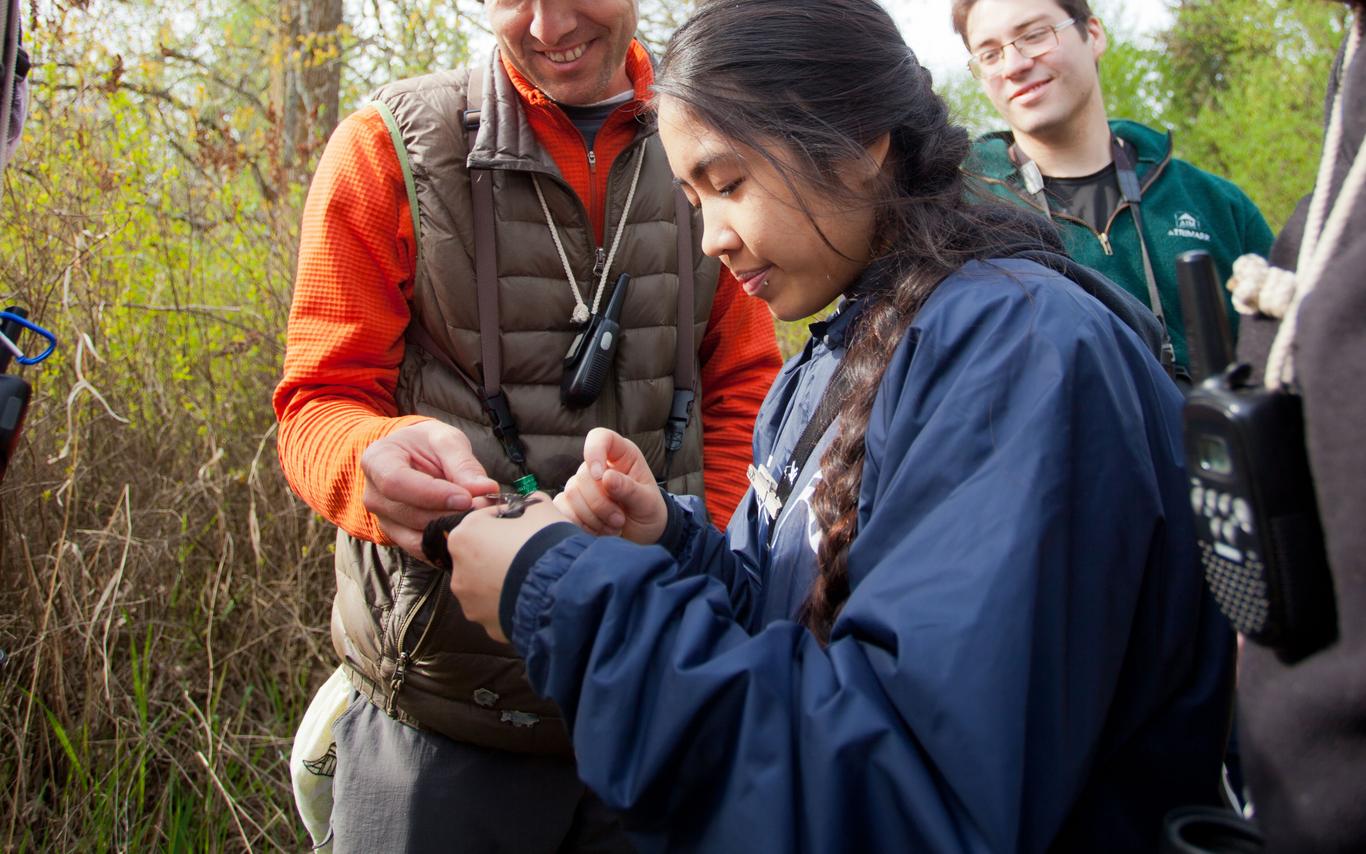[caption]
Fifteen REACH Award Recipients were chosen in the 2023-24 academic year, ten undergraduate and five graduate students. Please read below to learn a little more about their projects.
[/caption]The REACH Awards provide funding to students doing independent projects. The deadline is October 31. Connect with Vanessa.Moraes@viu.ca for more info!
Undergraduate Projects

Halle Wall – Faculty of Arts and Humanities
Bog Butter: Experimenting with the Preservative Nature of Peat Bogs
The anaerobic and highly acidic nature of peat bogs produces a suitable environment for preservation. Biological material which would usually decay, such as human tissue, is kept stagnant unable to decompose thus allowing for preserved individuals and items to be discovered. Peat bogs located in both modern-day Ireland and Scotland have produced an unusual type of artifact, Bog Butter. The butter, found in various types of containers, can be dated ranging from the early bronze age to the early modern period in Europe. To explore the meaning and purpose of bog butter deposits and peat preservation, a small peat bog was built to emulate the environment of northwestern Europe to closely study the production and preservation of bog butter. An exploration into the purpose of butter deposits in peat bogs could indicate the potential votive and religious, food storage, or flavour-enhancing purpose of this phenomenon. The purpose of this experiment is to foster more understanding of the lifeways of the Gaelic and Celtic peoples. By experimenting with the preservative qualities of a Peat Bog, the purpose, and cultural connotations of those who deposited the bog butter could become clearer, thus providing cultural context for the people of the past.
Department: History Faculty Mentor: Dr. Marie Hopwood
VIU Research Theme: Cultural Heritage

Jackson Busch - Faculty of Social Sciences
For the Love of Hermaphroditus: Exploring the Intersection of Trans Affirmation and Pagan Spirituality
This research seeks to understand if and how Pagan spirituality can affirm trans individuals' gender identity. In the last year, 45% of trans youth have considered attempting suicide and trans individuals are 16 times more likely to attempt suicide than cis counterparts (Paley 2022; Veale et al. 2017). Gender acceptance and affirmation are known to reduce adverse mental health outcomes in trans populations (Malatino 2020; Paley 2022) and Pagan spirituality is known to help individuals negotiate and affirm gender identity (Oboler 2010). Participants will be drawn from adults living withing the Greater Nanaimo Area who self-identify as trans and who practice Pagan spirituality. Using a qualitative approach, a semi structured interview format will be used to gather data. Each interview will begin by collecting participants demographic information including but not limited to, age, gender identity, and sexual orientation. Thematic questions will then be used to elicit participant experiences with gender identity and Pagan spirituality. All interviews will be recorded, transcribed, and analyzed by the principal investigator using narrative and discourse analysis to understand how participant experiences of transness and Pagan spirituality intersect.
Department: Anthropology Faculty Mentor: Dr. Colleen McVeigh
VIU Research Theme: Health, Resilience and Well-being
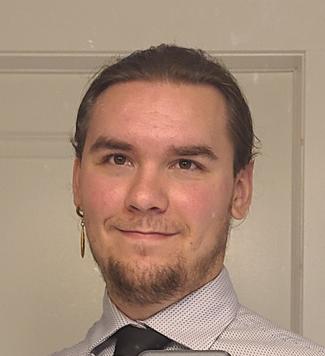
Samuel Detillieux - Faculty of Science & Technology
Microbiome Enrichment, but not Host Genetics Affects Long-Term Disease Resilience of Pacific Oyster, Crassostrea gigas
Pathogenic diseases such as Pacific oyster mortality syndrome (POMS), which is linked to Vibrio infection (Vibriosis), pose a significant threat to oyster aquaculture efforts. Vibrio is a bacterial pathogen of particular concern not only because it causes high mortality in oysters but also because it is a causative agent of human foodborne illness. Recent evidence suggests a healthy microbiome significantly contributes to the disease resilience o oysters. However, hatchery-raised larvae are often reared in heavily sterilized conditions and are therefore not exposed to the microbes needed to develop a healthy microbiome. While experimental evidence has pointed to microbiome enrichment as an effective potential technique to raise more resilient animals, it is not well understood which specific microbial species are responsible for this increase in resilience; nor is it known whether it is even attributable to any specific species present or simply due to the presence of any external microfauna during the crucial stages of larval development. To address these limitations in our knowledge, we employ a factorial experiment wherein larvae from two distinct families of oysters, differing in their field-tested resilience to external stressors, are administered two distinct microbiome enrichment treatments using these oyster families The questions we hope to answer are twofold: (1) Will microbiome composition of the larvae differ between treatment groups, and if so, (2) will the oysters display different levels of resilience to Vibrio infection later in life based on their microbiome enrichment treatment as larvae?
Department: Biology Faculty Mentor: Dr. Andrew Loudon
VIU Research Theme: Integrated Sciences, Technology and Environment

Liam Surry - Faculty of Science & Technology
Use of Genomic Techniques to Identify Markers Related to Bacterial or Viral Resistance in the Pacific Oyster, Crassostrea gigas
In the face of persistent pathogenic challenges, enhancing disease resistance within oyster populations emerges as a critical imperative in securing the sustainability of global oyster aquaculture. Since 2008, there has been an increase in mass oyster mortalities globally, decreasing Pacific oyster aquaculture worldwide. These mortalities are caused by Pacific Oyster Mortality Syndrome (POMS), which contains viral and bacterial components: Ostreid herpesvirus 1 (OsHV-1) and Vibrio. There has been extensive focus on selectively breeding oysters with increased resistance to OsHV-1; however, it is currently unknown how Vibrio affects these OsHV-1-resistant oysters. We aim to assess how Pacific oysters with the presence of an OsHV-1 resistance genetic marker differ in susceptibility to Vibrio infection using a Genome-Wide Association Study (GWAS). Our goal is to identify any additional genetic components related to bacterial susceptibility. We propose performing a disease challenge by exposing families of Pacific oysters to Vibrio aestuarianus, a known pathogen responsible for POMS. Oysters will be categorized based on being resistant or susceptible to Vibrio, and DNA will be extracted for genotyping. We additionally aim to identify the prevalence of the OsHV-1 bacterial resistance marker in Pacific oyster offspring that are sensitive or resistant to Vibrio exposure.
Department: Chemistry Faculty Mentor: Dr. Ben Sutherland
VIU Research Theme: Integrated Sciences, Technology and Environment
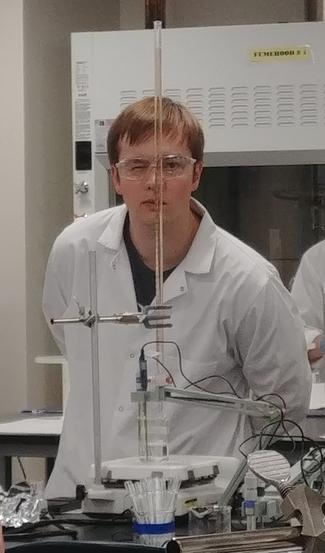
Jindar Sboto - Faculty of Science & Technology
Blood Plasma Cannabis Testing by Functionalized Paper Spray Mass Spectrometry
Even though it has been 5 years since the legalization of cannabis in Canada, there are still many unanswered questions about its safety. Given how detrimental the effects of prenatal alcohol exposure are in fetal development, one can only question how cannabis might affect the developing fetus. Unfortunately, these effects are not well known, and there are still significant challenges in the measurement of cannabinoids in blood plasma and other bodily fluids. Current approaches are extremely time consuming and expensive, requiring upwards of 30 minutes to analyze a single sample, greatly limiting the scope of investigations possible. Paper spray mass spectrometry allows for the rapid and inexpensive measurement of cannabinoids; however, methods have not yet been developed that can differentiate THC and CBD in complex matrices such as blood plasma. This study will develop a method for differentiating cannabinoids by one of two methods: 1. Argentation, the process of using silver ion adducts of THC and CBD allowing their differentiation by tandem mass spectrometry, or 2. By chemical functionalization of THC and CBD with Fast Red RC salt, allowing for higher sensitivity measurements. This research will center on paper spray mass spectrometry method development for detection of THC and CBD aimed at future measurements in plasma, with long term applications aimed at assessing the dangers of CBD and THC exposure on fetal development.
Department: Chemistry Faculty Mentor: Dr. Chris Gill
VIU Research Theme: Integrated Sciences, Technology and Environment

Natasha Ladouceur - Faculty of Social Sciences
The Power of Perception: Predictors of Police Legitimacy in Canadian Citizens
Legitimacy is defined as the extent to which citizens perceive law enforcement to be a legitimate source of authority, with four distinct factors: 1) police lawfulness, 2) distributive justice, 3) procedural justice, and 4) police effectiveness (Tankebe et al., 2016). At present, there is a limited body of research exploring the psychology that underlies how citizens perceive the police. The majority of empirical investigations have focused on prior police interactions, demographic factors, and neighborhood disadvantage (Bolger et al., 2021), with scant research conducted in a Canadian context (Ewanation et al., 2019). The study’s purpose is to understand the psychology of perceptions towards law enforcement through the following research question: What role do emotional experience and personality play in Canadians’ perceptions of police legitimacy? Several psychological inventories will be used to address the research question: the Police Legitimacy Scale (Tankebe et al., 2016), the Fear of Crime Scale (Etopio & Berthelot, 2022), the Trait Emotional Intelligence Questionnaire (Petrides, 2009), the Emotional Regulation Questionnaire (Gross & John, 2009), the State-Trait Anxiety Inventory (Spielberger, 1983), and the Big Five Personality Test (Soto & John, 2017). A regression analysis will be performed to predict participants’ scores on the Police Legitimacy Scale, controlling for the variables established in prior studies. This research expects that understanding the variations in how Canadians perceive the police will enhance societal attitudes and foster improved police-community relations.
Department: Psychology Faculty Mentor: Melanie O'Neill
VIU Research Theme: Equity, Diversity and Social Justice
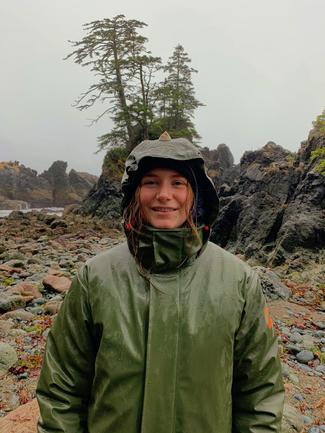
Nicole Williams - Faculty of Science & Technology
Influence of moonlight intensity and nightly lunar illumination levels on the vocal activity of the Coastal Western Screech-Owl (Megascops kennicottii kennicottii) within an ancient forest on Vancouver Island, BC.
Populations of the coastal Western Screech-owl (Megascops kennicottii kennicottii) on Vancouver Island, BC, are declining. Surveying populations of this species on Vancouver Island can be completed through passive acoustic monitoring, which depends on vocalization detections. When passively monitoring, it is crucial to account for environmental factors that may impact owl vocal activity. Previous studies have shown that moon illumination levels positively impact owl vocal activity. Due to this impact, the objective of this project is to determine if moon illumination levels between nights, and within nights, impact the detection of coastal Western Screech-owl vocalizations during passive monitoring. In partnership with the Pacific Megascops Research Alliance (PMRA), this study may help refine the methodology for future passive acoustic monitoring projects, ultimately providing more accurate assessments of coastal Western Screech-owl populations on Vancouver Island.
Department: Biology Faculty Mentor: Dr. Eric Demers
VIU Research Theme: Integrated Sciences, Technology and Environment

Zeke Critchlow - Faculty of Science & Technology
Applications of Data Visualization
The initiative, 'Applications of Data Visualization,' dives into the decisive field of transforming intricate datasets into dynamic visual models, spotlighting the Shambhala Music Festival (SMF) as its central case study. The festival's vibrancy masks an intricate challenge: ensuring patrons' well-being at the heart of large-scale events. The medical team currently uses web and mobile applications to document patient encounters. But with myriad data points floating, how can real-time decisions be informed? Enter the project's objective: devising an intuitive data dashboard to decode and present this data, facilitating prompt and effective medical responses. The project promises a multi-faceted exploration, ranging from rigorous stakeholder consultations to crafting user-centric design prototypes, ensuring the dashboard seamlessly aligns with real-world needs. Apart from other parallel initiatives, a distinguishing factor is its exclusive focus on the festival's medical services. This undertaking blends data visualization methodologies with the pulse of event healthcare, poised to redefine how mass gatherings leverage data for optimized medical interventions
Department: Computer Science Faculty Mentor: Dr. Luis Meneses and Dr. Sarah Carruthers
VIU Research Theme: Integrated Sciences, Technology and Environment

Sarah Sheppard - Faculty of Social Sciences
The Relationship Between Disordered Eating and Post-Substance Use Treatment Outcomes
Mental health and substance use problems are rampant in British Columbia, with over 50% of the population having experienced a mental health or substance use problem by the time they turn 40. One of the primary treatment options for substance use is inpatient treatment, which is extremely expensive, with 50-day treatments costing up to $40,000 on Vancouver Island. Improving post-treatment substance use outcomes is imperative, as many cannot afford to return for further treatment, and the mortality rates associated with substance use are high. Eating disorders are a co-morbid concern related to poorer treatment outcomes, including increased substance relapse and poorer overall psychosocial functioning. Disordered eating behaviours like restriction, bingeing, and purging behaviours that do not meet the clinical threshold for an eating disorder diagnosis have also been found to relate to long-term psychological distress; however, an investigation into how disordered eating and post-treatment outcomes may relate to one another has not been undertaken. The present study will look for relationships between disordered eating and treatment outcomes by surveying individuals who have attended a residential inpatient facility on Vancouver Island. By measuring disordered eating symptoms along with treatment outcomes in terms of psychological distress, drug-taking resistance confidence, and overall quality of life, this project aims to quantify any relationship between disordered eating and post-treatment outcomes. The study's results will be submitted for presentation at various conferences and publication in academic journals, aiming to improve the treatment of substance use by better addressing disordered eating in inpatient treatment.
Department: Psychology Faculty Mentor: Dr. Elliot Marchant
VIU Research Theme: Health, Resilience and Well-being

Katrin Hannesson - Faculty of Social Sciences
A comparison of time-restricted feeding and calorie restriction for the treatment of Alzheimer’s disease in a Drosophila Melanogaster model
Alzheimer’s disease is a tragic neurological disorder, characterized primarily by dementia, a symptom that encompasses cognitive deficits such as memory loss, emotional difficulties, and personality changes. It is expected that by 2030, 1 million Canadians will be living with this disorder. Despite its prevalence, there are very few effective treatments for Alzheimer’s. Current research suggests that the way we consume food can influence the onset and progression of disease. Time-restricted feeding and dietary restriction are two such methods that are a large focus of current research. While many studies have investigated time-restricted feeding and dietary restriction in the aging process, less research has been done on their impacts on Alzheimer’s disease. The aim of the present study is to investigate and compare the effects of time-restricted feeding and dietary restriction on the lifespan, symptoms and underlying biological correlates (specifically amyloid plaques) of Alzheimer’s disease using Drosophila Melanogaster as a model. The findings of this study could contribute to the further development and evaluation of time-restricted feeding and dietary restriction as potential treatments for Alzheimer’s disease in humans.
Department: Psychology Faculty Mentor: Dr. Elliot Marchant
VIU Research Theme: Health, Resilience and Well-being
Graduate Projects

Naveed Ali - Faculty of Education / Master of Education in Educational Leadership
Superdiversity as a Superpower: Honouring IBPOC Stories in Provincial Literacy Assessment Practices
Deep learning experiences are ones that are inherently human – they are forged through connection, community and safety which culminate to evoke feelings of accomplishment, trust and empowerment amongst all involved. These experiences create safe stories of holistic learning for youth rooted in equitable and decolonized assessment practices that serve as trail markers for life-long learning journeys. Currently, there are a variety of high-stakes assessments such as the Graduation Literacy Assessment in BC and the Ontario Secondary School Literacy Assessment that do not display the aforementioned holistic and human components of learning. Instead, they maintain neoliberal practices within the field of education through an over-reliance on colonial and racist methods of collecting student performance data. Furthermore, research has identified that there is a significant marginalization of Indigenous, Black, and People(s) of Colour (IBPOC) learners within these high-stakes assessments which further perpetuate the inequities evident within the educational system. My experiences as an educator in both Ontario and BC – alongside the conversations that I have had with learners who have undertaken these high-stakes assessments have led me to my research inquiry: In what ways are the superdiverse and intersectional stories in IBPOC learners' experiences honoured through decolonized and anti-racist practices within high-stakes provincial assessments such as the GLA and OSSLT? This inquiry will be utilizing participant interviews through a co-autoethnographic narrative lens to uncover stories and to empower the oft-silenced superdiverse voices of those at the margins of the inequitable and colonial educational system.
Faculty Mentor: Dr. Paige Fisher
VIU Research Theme: Teaching and Learning

Megan Thompson - Faculty of Education / Master of Education in Educational Leadership
How 21st Century Skills can be Approached in British Columbia’s High Schools
Teachers in British Columbia are tasked to help students develop the knowledge, attitudes, and skills to succeed in the world after school. A significant part of this mandate is to help students develop core skills like ‘communication,’ ‘cultural awareness,’ and ‘critical thinking.’ Yet figuring out how to help students to develop these skills has been a challenge for teachers in BC and around the world. Studies tend to highlight these deficits. Success-stories do exist though. This research aims to address these stories in the BC context by interviewing high school teachers who have approached Core skills in their classrooms. By analyzing participant teachers’ experiences this research hopes to highlight some pathways forward for other teaching professionals.
Faculty Mentor: Dr. Sean Toal
VIU Research Theme: Teaching and Learning
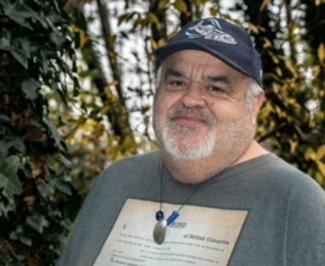
Joseph Starr - Faculty of Education / Master of Education in Educational Leadership
Unboxing Our History: Wahouksgamalayou and How Residential Schooling Came to Cimoca
‘Unboxing Our History: Wahouksgamalayou and How Residential Schooling Came to Cimoca’ will provide a story and history for First Nations Studies 12 students and teachers in an accessible way, for those who have little to no knowledge of this important history. The project explores the first Cimoca to embrace the gospel while in Victoria in 1874, This project will also explore the influence of lay missionaries and workers under the direction of Reverend Thomas Crosby and Reverend George Raley, as well as the influence of the established ‘Homes’ in Lax Kwala’ams on the creation of the first residential school in Cimoca (Kitamaat, BC). Included are the manners in which George Raley utilized the local Haisla language to communicate his vision for the ‘Homes’ to the leadership of the Hiasla Nation at a time when Christianity was taking hold in Indigenous communities in BC. Research methods include the use of the written histories documented in the literature of the late 1800s to early 1900s. The project is written from an observer’s viewpoint and the completed project will highlight as a primary document, a historical representation of the stories and experiences of time through the use of quilting methodology.
Faculty Mentor: Dr. Fred Schaub
VIU Research Theme: Teaching and Learning
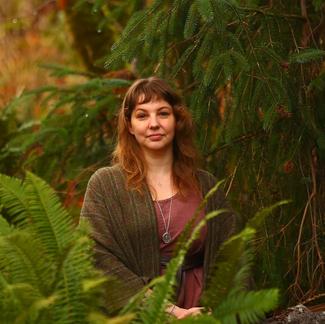
Natalie Raedwulf Pogue - Faculty of Education / Master of Education in Special Education
Exploring autistic educator and student experience: an autoethnography
The purpose of my research is to build an understanding of my experiences as an autistic individual related to schooling, schools and pedagogy, so that I may raise awareness in educators and impact their pedagogical decisions related to how they may support autistic students. Disrupted and low school attendance and lower school completion rates have been recognized as a disproportionate problem for autistic students, despite many autistic students demonstrating average and above-average intelligence. In addition, autistic people report lower rates of well-being, positive self-identity, and feelings of belonging at school. Research regarding autistic perspective on school experience is an emerging field and there are currently gaps in the research regarding what strategies and supports can better improve autistic students' success and wellbeing at school from the perspective of autistic people. To better understand factors that impact autistic students’ success rates and well-being at school, this autoethnographic inquiry explores my own experiences and challenges in public schools, both as an autistic student and educator, as a means to identify possible collective themes and similar experiences impacting autistic people in schools. In addition, this project proposes possible solutions and recommendations to improve support for autistic students in public schools.
Faculty Mentor: Dr. Heather Brown
VIU Research Theme: Teaching and Learning

Nova Heartland - Faculty of Education/ Master of Education in Educational Leadership
An Appreciative Inquiry Towards School-Based Meditation
Research indicates that while wellness tools such as school-based meditation exist in elementary and secondary schools, students continue to report a decline in mental health. The purpose of this project is to explore factors that influence principals’ and vice principals’ implementation and teachers’ delivery of meditation for students as in-school and in-classroom mental health resources. Using a Vancouver Island school district as a case study, this project will use qualitative data collection methods of online anonymous open-ended question surveys and in-person focus groups to answer and discuss open-ended questions. Research questions guiding this study are: How do elementary and secondary school educators in this school district report their experiences with implementing and delivering in-school and in-classroom meditation, and what do these educators report are the impacts of school-based meditation on the quality of student mental health? This project will be supported by a systematic literature review identifying how Canadian and international elementary and secondary school educators report their experiences with implementing and delivering in-school and in-classroom meditation, and what they report are the impacts of school-based meditation on the quality of student mental health. This project will identify positively impactful school-based meditation practices, interpret the elements sustaining these practices, and discuss ways in which more opportunities to amplify educators’ experiences and student mental health can be achieved. This project’s findings aim to draw conclusions about the climate of school-based meditation from educators' perspectives, and educators’ impressions on the development of student mental health in Canadian contexts with school-based meditation programs.
Faculty Mentor: Dr. Amanda Wager
VIU Research Theme: Teaching and Learning
